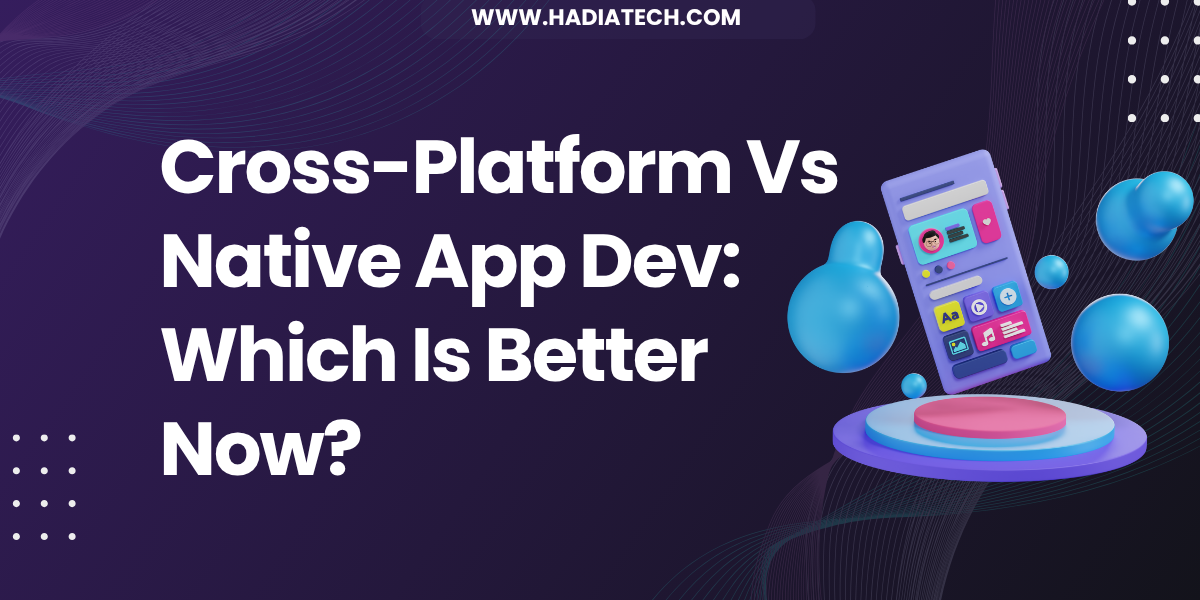Cross-Platform Vs Native App Dev
In the fast-evolving world of mobile app development, businesses and developers face a critical decision: cross-platform vs native app development? Both approaches have unique strengths and trade-offs, and choosing the right one depends on your project goals, budget, and target audience.
This blog explores the differences between cross-platform and native app development, their pros and cons, and which option suits your needs in 2025.

What Is Cross-Platform App Development?
Cross-platform app development involves building a single application that runs on multiple platforms, such as iOS and Android, using frameworks like Flutter, React Native, or Xamarin. Developers write one codebase, which is then deployed across different operating systems, saving time and resources.
Benefits of Cross-Platform App Development
Cost Efficiency: By using a single codebase, cross-platform app development reduces development costs significantly. Businesses can launch apps on both iOS and Android without hiring separate teams for each platform.
Faster Development Time: Writing one codebase means quicker development cycles, allowing apps to reach the market faster.
Easier Maintenance: Updates and bug fixes are applied to a single codebase, simplifying maintenance compared to managing separate iOS and Android apps.
Wider Reach: Cross-platform apps can target both iOS and Android users, maximizing audience reach with minimal effort.
Drawbacks of Cross-Platform App Development
Performance Limitations: Cross-platform apps may not match the speed and responsiveness of native apps, especially for complex, resource-intensive applications.
Limited Access to Native Features: Some platform-specific features (like advanced camera controls or AR capabilities) may be harder to implement or less optimized.
UI/UX Consistency: Achieving a seamless, platform-native look and feel can be challenging, as cross-platform frameworks may not fully replicate native design standards.

What Is Native App Development?
Native app development involves building apps specifically for one platform, such as iOS (using Swift or Objective-C) or Android (using Kotlin or Java). Each platform requires its own codebase, tailored to its operating system’s architecture.
Benefits of Native App Development
- Superior Performance: Native apps are optimized for their respective platforms, offering faster load times, smoother animations, and better overall performance.
- Full Access to Platform Features: Native development allows seamless integration with device-specific features like GPS, push notifications, and advanced sensors.
- Enhanced User Experience: Native apps adhere to platform-specific design guidelines (e.g., Apple’s Human Interface Guidelines or Google’s Material Design), ensuring a polished and intuitive UI/UX.
- Better Security: Native apps can leverage platform-specific security features, providing robust protection for sensitive user data.
Drawbacks of Native App Development
Higher Costs: Developing separate apps for iOS and Android requires more resources, increasing development and maintenance costs.
Longer Development Time: Building two separate codebases takes longer, delaying time-to-market compared to cross-platform app development.
Complex Maintenance: Updates and bug fixes must be applied to both iOS and Android versions, doubling the effort for developers.
Cross-Platform vs Native App Development: Key Considerations
When deciding between cross-platform and native app development, consider the following factors:
1. Budget and Resources
If you’re a startup or small business with limited funds, cross-platform app development is often the better choice due to its cost efficiency and faster development timeline. Larger enterprises with bigger budgets may opt for native app development to ensure top-tier performance and user experience.
2. App Complexity
For simple apps like e-commerce platforms, informational apps, or social media tools, cross-platform app development frameworks like Flutter or React Native are often sufficient. However, for complex apps like gaming, AR/VR, or apps requiring heavy computation, native app development is usually the better option.
3. Target Audience
If your audience is split across iOS and Android, cross-platform app development ensures you reach both markets efficiently. If your users are primarily on one platform (e.g., iOS in the U.S.), native app development might be worth the investment for a tailored experience.
4. Time-to-Market
Need to launch quickly? Cross-platform app development enables simultaneous deployment across multiple platforms, making it ideal for MVPs (minimum viable products) or time-sensitive projects.
5. Long-Term Goals
Consider your app’s future. If you plan to add advanced features or scale significantly, native app development offers better flexibility and performance. For apps with simpler, long-term maintenance needs, cross-platform solutions are more practical.

Trends in 2025: What’s Shaping the Choice?
In 2025, advancements in cross-platform app development frameworks like Flutter and React Native have narrowed the performance gap with native apps. These frameworks now support more native-like features, better UI rendering, and improved developer tools. However, native app development remains the gold standard for high-performance applications, especially in industries such as gaming, finance, and healthcare.
The rise of 5G, AI, and AR/VR technologies is also influencing this decision. Native apps are better equipped to handle these cutting-edge features, while cross-platform solutions are catching up but may still lag in specific use cases.
Which Is Better for You?
There’s no one-size-fits-all answer to whether cross-platform app development or native app development is better. Here’s a quick guide:
Choose Cross-Platform App Development if:
- You have a limited budget or a tight timeline.
- Your app is relatively simple, or an MVP.
- You want to reach both iOS and Android audiences quickly.
Choose Native App Development if:
- Your app requires high performance or complex features.
- You need a highly polished, platform-specific user experience.
- Your budget allows for separate iOS and Android development.

Conclusion
Both cross-platform app development and native app development have their place in 2025. Cross-platform solutions offer cost savings and speed, making them ideal for startups and simpler apps. Native apps, however, deliver unmatched performance and user experience, perfect for complex or premium applications. By weighing your project’s goals, budget, and audience, you can make an informed decision that aligns with your business needs.




